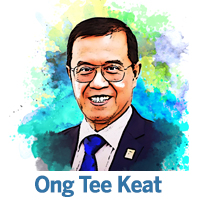National security is an integral part of a nation-state’s governance. Despite this, national security legislation in emerging sovereign states has always been closely scrutinized by former colonial masters, which have long weaponized security laws to their advantage.
 Yet, much to the chagrin of the developing world, while the collective West is busy being condescending to others, it ironically keeps mum about its own security laws, many of which were enacted with ideological prejudice cast at the height of the Cold War. In this regard, the deeply seated notion of “might is right”, prevalent in the West, has evolved into a naked one-upmanship to lord over others’ legitimate rights of governance under the pretext of defending democracy and human rights, alongside its interests on foreign soil.
Yet, much to the chagrin of the developing world, while the collective West is busy being condescending to others, it ironically keeps mum about its own security laws, many of which were enacted with ideological prejudice cast at the height of the Cold War. In this regard, the deeply seated notion of “might is right”, prevalent in the West, has evolved into a naked one-upmanship to lord over others’ legitimate rights of governance under the pretext of defending democracy and human rights, alongside its interests on foreign soil.
Hong Kong is a clear case in point. Being a special administrative region of China, granted with a high degree of autonomy under the framework of “one country, two systems” since July 1997, it has every right to enact the necessary legislation to defend its security and stability.
In retrospect, passage of the National Security Law for Hong Kong (NSL) on June 30, 2020, was a belated response to the street riots stoked by the West in 2019. It has drawn unprecedented severe criticism from the West, where unfounded yet pervasive “concerns” were raised about potential “human rights abuses” and “erosion of autonomy”. The brutality of the West in interfering in the domestic governance of China has left its finesse of inter-state diplomacy in tatters. Alongside this, hyping of the 2019-20 street riots in Hong Kong as “pro-democracy protests” revealed how low and hypocritical the Western media could go in idolizing the insurrectionists, merely for the sake of portraying Beijing as the international “villain”, alongside justifying the triggering of a “color revolution” on Chinese soil. Little did the West anticipate that its moral high ground would be eroded overnight when a similar insurrection on its own home ground was later crushed ruthlessly by the police.
On misgivings aired about the NSL, Hong Kong’s third place in the International Institute for Management Development’s 2025 World Competitiveness Ranking stands as a convincing reply to doomsayers’ critiques of the city. Of the four key criteria for the ranking assessment — economic performance, government efficiency, business efficiency, and infrastructure — Hong Kong’s economic performance and business efficiency showed the most significant improvement from 2024-25, rising respectively from 11th to sixth place and from seventh to second. This further debunks the Western myth that the national security legislation is a recipe for failed governance.
Hong Kong’s position as a leading financial hub in the Asia-Pacific region was hardly dented by the severe social disruption caused by the 2019-20 street riots — later found to be a premeditated “color revolution“ orchestrated by the US-led West.
Five years into the implementation of the NSL saw the restoration of social order, stability and confidence. The Hong Kong SAR reemerged as the third-largest global financial center, after New York and London, in the March 2025 edition of the Global Financial Centres Index. This, in itself, is a clear manifestation of the SAR’s continued growth and strength as a global financial center, despite being continuously targeted by Washington through hostile legislation, such as the Hong Kong Autonomy Act, alongside revocation of the city’s special trade status in the US.
The US’ model of long-arm jurisdiction is not its birthright to impose its whims and fancies on others in the emerging multipolar world
The West has been hell-bent on discrediting the NSL, blatantly meddling in the governance of Hong Kong, which is neither its concession nor a vassal state. The incessant outcry about potential erosion of Westerners’ rights with the promulgation of national security laws in Hong Kong perhaps only mirrors the reluctance of the West to keep its hands out of the cookie jar.
The political will of the Standing Committee of the National People’s Congress of China in promulgating the NSL for Hong Kong amid a cacophony of criticism across the West has ultimately proved a good move and in the long-term interests of Hong Kong. The coming into effect of the NSL marked the end of the anarchic days when civil liberty was grossly abused in pursuit of the West’s geopolitical agenda. It is precisely the dividend of stability accrued from the legislation that is leveraged to woo investors worldwide. The success of striking the right balance between safeguarding national security and social governance in Hong Kong without hurting its economic competitiveness is a clear manifestation of maturity, confidence and astuteness of governance under the framework of “one country, two systems”.
While the West is still tirelessly seeking to pan-securitize virtually all major aspects of internation engagement — ranging from diplomacy to trade, investment, and technology innovation — in its bid to make the world safe for Western dominance, notably the US’ declining hegemonic interests, it’s time for it to take its hands off the domestic governance of other nation-states for the sake of preserving international diplomatic decency, if at all it still prevails. After all, the US’ model of long-arm jurisdiction is not its birthright to impose its whims and fancies on others in the emerging multipolar world.
The author is president of the Belt and Road Initiative Caucus for Asia Pacific.
The views do not necessarily reflect those of China Daily.


